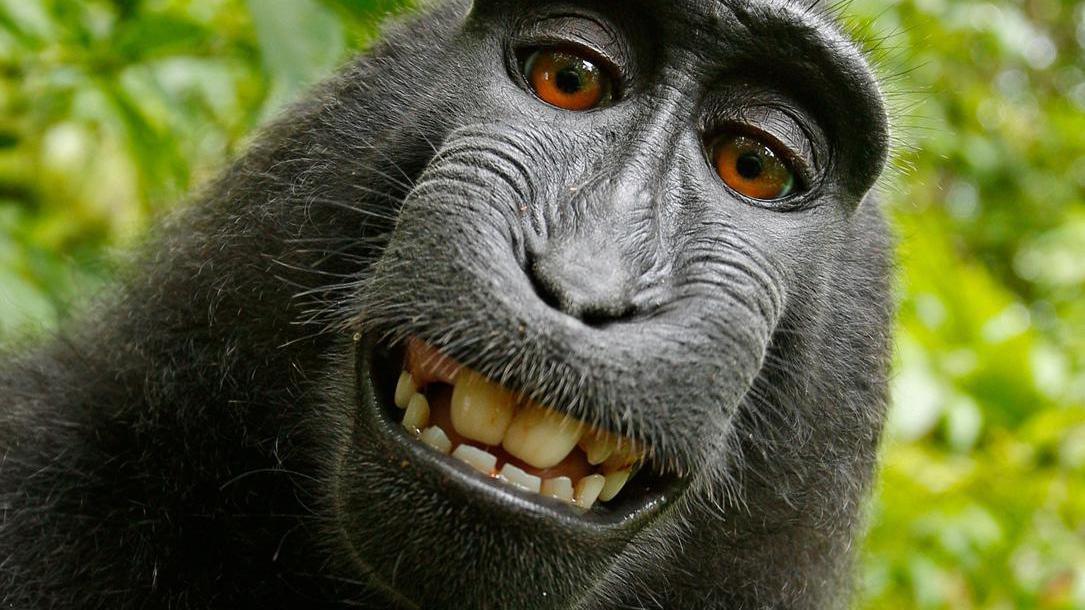That monkey selfie? The US government says it belongs to all of us
This monkey self-portrait has been the subject of an intense dispute over copyright.
The US Copyright Office has apparently weighed in on a debate between a photographer and Wikipedia over who owns the rights to a photo taken by a monkey. According to the US government, at least, the answer is no one — exactly as Wikipedia has been arguing all along.
We first brought you the story of photographer David Slater and the monkey selfie about three weeks ago, when the dispute spilled into the public eye. Macaque monkeys in Indonesia happened upon the photographer's equipment in 2011 and snapped the now-famous photo. Slater argued he owned it. But a newly-updated US copyright manual states that a photo taken by an animal cannot be copyrighted at all — and, just to be clear, it lists examples, like "a photograph taken by a monkey."
Therefore it's in the public domain — free for anyone to use. Ars Technica looks at the ongoing battle by Slater to claim rights, and royalties, to the photo.
(Editor's note: The Global Scan can be delivered straight to your inbox every weekday. Just register and sign up today.)
China works on a new Great Wall — and this one is green
China is about one-quarter desert, and officials in Beijing think that's quite enough. So the government has long led a re-forestation project along the northern deserts: The Three North Shelterbelt Project. Some 66 billion trees have been planted since the project started in 1978, and by the time it concludes, if all goes according to plan, it will increase the world's forest canopy by more than 10 percent.
Unfortunately, all isn't going to plan, according to the Economist. Some of the original trees are already dying, many because they're poorly suited for the long-deforested, arid ecosystem. Experts say that, with the right species, China's great green wall can halt the spread of the desert, and in some cases it has. But for now, the desert is winning, and taking back some of the land claimed by the trees.
Lingerie company realizes its new 'Isis' line may need a rebranding
Talk about unfortunate timing. A new lingerie line — bras, thongs and more — is just hitting the market from the lingerie company Ann Summers with the brand name "Isis." Of course, it is the same name as the Islamic militant organization that is terrorizing Syria and Iraq and is thought responsible for the beheading of American journalist James Foley last week.
According to The Independent, the lingerie line was named after the Ancient Egyptian goddess of love, Isis, long before ISIS the terrorist organization had become a household name. By the time the company realized the unfortunate connection, all of the clothes had been produced. Officials at Ann Summers apologized for the connection, but gave no word on when (or even if) the line would be renamed.
As sea levels rise, Vietnam's rice crop is threatend
Rice farming is a crucial industry in Vietnam, employing — and feeding — a large portion of the population in the country's Mekong Delta region. But rising sea levels, and general environmental degradation, have made it increasingly difficult for rice farmers to grow their crops. The delta is being infiltrated by ocean water, which kills the rice plants in their paddies.
PRI's The World talked to one farmer, Hai Thach, who lost $300 to the salt water — about half of what he hopes to take home in an entire year. The situation has led some to abandon rice farming altogether in favor of shrimp farming, but that presents its own problems.
This New York museum captures life in all of its mundane glory
At the Mmuseumm (and no, that's not a typo) in New York City, the exhibits range from shoes to dead mosquitoes. They also include a mop you can put on your baby, so his crawling will clean your floors. You may have guessed by now that this is no any ordinary museum.
It's an abandoned elevator shaft that has become home to exhibitions with these requirements: the works must not be art, nor sentimental. It's proving the old adage, one man's trash is another man's treasure.
PRI's The World visited the museum and has photos of the exhibits. The museum's founder, Alex Kalman, points to one particular exhibit: a collection of pool-toy packaging from Saudi Arabia. In each instance, censors took a black sharpie to any picture of a female in a bikini, leading to some awkward juxtapositions. You have to see it.
What we're seeing on social
Weather around the world
It was a scorcher in Baghdad today — the hottest place in the world. The mercury climbed to 121 degrees Fahrenheit, or 49.3 Celsisus, according to AccuWeather.
Every day, reporters and producers at The World are hard at work bringing you human-centered news from across the globe. But we can’t do it without you. We need your support to ensure we can continue this work for another year.
Make a gift today, and you’ll help us unlock a matching gift of $67,000!
